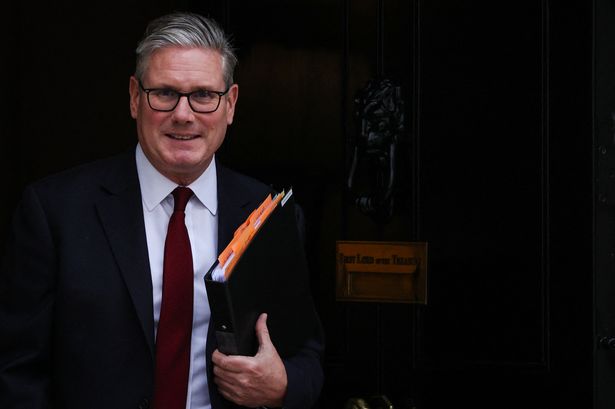The Prime Minister will sign the deal today, which will see businesses and workers in Northern Ireland benefit from lower tariffs, fewer barriers to trade, and easier customs Prime Minister Keir Starmer is expected to sign the deal today(Image: ADRIAN DENNIS/AFP via Getty Images)
Prime Minister Keir Starmer is expected to sign the deal today(Image: ADRIAN DENNIS/AFP via Getty Images)
Northern Ireland businesses and employees stand to gain from the UK’s trade pact with India, according to new analysis released today [Thursday 24 July]. The groundbreaking agreement is projected to pump an additional £50m into the local economy as part of the UK Government’s Plan for Change.
The Prime Minister is set to meet his Indian counterpart Narendra Modi this morning for the signing of the trade deal, while Business and Trade Secretary Jonathan Reynolds and Commerce Minister Piyush Goyal ink the landmark agreement. This follows a string of investment and export victories confirmed by UK and Indian businesses, representing a total boost of nearly £6 billion and the creation of over 2,200 jobs.
India represents a burgeoning market for Northern Irish businesses, with 143 firms exporting goods worth £65 million there last year– a figure that could see significant growth thanks to reduced tariffs, fewer trade barriers, and simplified customs procedures.
Advanced manufacturing and engineering, which account for roughly 30 per cent of employment in Northern Ireland, are set to gain from the slashing or elimination of tariffs.
The medical technology sector in Northern Ireland is poised for a boost with tariffs on an array of medical devices, currently ranging from 8.25 per cent to 13.75 per cent, being cut by half or scrapped entirely within a decade.
Irish whiskey producers are toasting to immediate tariff reductions from 150 per cent down to 75 per cent, with a further decrease to 40 per cent over the next ten years. Additionally, they’ll have the flexibility to use Irish barley or neutral grain spirit and bottle their products while en route to India, enhancing their ability to leverage the tariff cuts.
Secretary of State for Northern Ireland, Hilary Benn, remarked: “This is a landmark deal that will bring real benefits for businesses and workers in Northern Ireland.
“Northern Ireland‘s advanced manufacturing, engineering, and medical technology sectors will see tariffs eliminated or significantly reduced, while Irish whiskey producers will benefit from substantial cuts in duties, allowing for increased trade with India
“This agreement will help further unlock the huge potential for growth across Northern Ireland, including its thriving services and technology sectors.”
Business and Trade Secretary Jonathan Reynolds commented: “The millions brought to Northern Ireland each year from the deal we’ve signed with India today will be keenly felt across local communities, whether that’s higher wages for workers, more choice for shoppers, or increased overseas sales for businesses.
“This government is proving time and again that we can deliver on our mission to grow the economy, put more money in pockets and boost living standards under our Plan for Change.”
Philip McKee, Sales Manager at Biopanda, a Belfast-based medtech manufacturer which exports in vitro test kits for clinical laboratories, veterinary practice, and food safety laboratories, commented: “Biopanda have been supplying a range of diagnostic products to the Indian market throughout the past ten years. We value the business we have done already throughout India and with the introduction of the UK-India FTA this should benefit in increased trade with the removal of export barriers.
“This will hopefully increase the market access, allowing our distributors throughout India to provide a larger range of our highly accurate clinical diagnostic products at a lower price to the consumer.”
Workers in Northern Ireland are set to see their pay packets swell as UK wages are expected to rise by a total of £2.2 billion annually, while consumers could enjoy lower prices and a wider selection of clothing, footwear, and food items. With the UK already importing £11 billion worth of goods from India, the easing of tariffs on Indian imports will simplify and reduce the cost of acquiring top-quality Indian products.
For businesses in Northern Ireland, this could translate into potential savings when importing components and materials used in sectors such as advanced manufacturing or luxury and consumer goods. India’s trade-weighted average tariff will plummet from 15 per cent to 3 per cent, making it easier for Northern Irish companies selling products ranging from whiskey and soft drinks to cosmetics and medical devices to penetrate the Indian market.
This gives the UK an edge over international competitors in accessing the Indian market, which is projected to boast over a quarter of a billion high-income consumers by 2050. In line with the UK’s recent Industrial and Trade Strategies, the deal is set to bolster the sectors that contribute most to economic growth.
In Northern Ireland, sectors such as agriculture and food, advanced manufacturing and engineering, and the services and technology sectors stand to gain significantly.
For all the latest news, visit the Belfast Live homepage here and sign up to our politics newsletter here.
